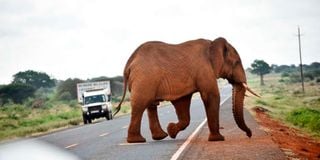Premium
Human-wildlife conflict on rise as animal space shrinks

An elephant crosses the Tsavo East game drive along the Voi-Mwatate-Taveta road.
Human-wildlife conflicts have left the government with compensation claims amounting to more than Sh6 billion by June 2022.
Tourism, Wildlife and Heritage Cabinet Secretary Peninah Malonza said the amount could have risen by more than Sh2 billion in the last 10 months due to drought induced human-wildlife conflicts.
According to the CS, the Kitui region was currently struggling with elephant invasion due to poor rains in the Tsavo National Park.
“The prolonged drought forced many wild animals to leave protected areas in search of pasture. Currently, there are 140 marauding elephants in Kitui because Tzavo does not have enough feed for them. As a ministry, we are also working towards enhancing preventive measures to reduce invasions,” she said.
Ms Malonza spoke at the Northern Rangelands Trust (NRT) headquarters at Lewa Conservancy in Meru on Friday when she toured the region to assess NRT’s community conservation model.
She was accompanied by Wildlife Principal Secretary Sylvia Museiya and the ministry’s Chief Administrative Secretary Rehema Jaldesa among other government officials.
Ms Malonza said paying compensation for death of people, injuries and loss of property was becoming a tall order for the government due to the huge claims coming through.
“Currently, we only have Sh1.8 billion to pay compensation after we secured Sh900 million from a non-governmental organisation. We must come up with a solution on how to pay compensation claims because the law provided a very punitive figure of Sh5 million for death and Sh3 million for injuries. One of the solutions we are looking at is setting up an insurance scheme,” CS Malonza said.
Earlier, Ms Museiya had said the ministry was in advanced stages of developing an insurance scheme that will aid in paying compensation claims arising from human-wildlife conflicts.
CS Malonza said with more than 60 percent of wildlife living outside protected areas, there was a need to develop a conservation model that is sustainable.
She said the NRT supported community conservancies should also consider supporting in payment of compensation claims arising from human-wildlife conflicts.
“Community conservancies draw benefits due to the wild animals they host but when it comes to compensating victims, they leave the burden to the ministry. We will look into how to partner with NRT and the community conservancies to handle compensation in their areas,” the CS said.
However, NRT chief executive officer Tom Lalampaa said some community conservancies had piloted giving a consolation token to victims of human-wildlife conflicts but it was found to be unsustainable.
Meanwhile, the cabinet secretary lauded the community conservancy model saying it was in line with the Kenya Kwanza administration’s plan to diversify tourism.
“Kenya has traditionally relied on beach and wildlife but we also want to go into sports, culture, community, adventure, agro tourism and other varieties. NRT’s conservation model of working with communities is commendable as it also supports livelihoods,” she said.
CS Malonza said the ministry was planning a countrywide ‘royal tour’ where President William Ruto will act as the tour guide of the country’s rich heritage.





